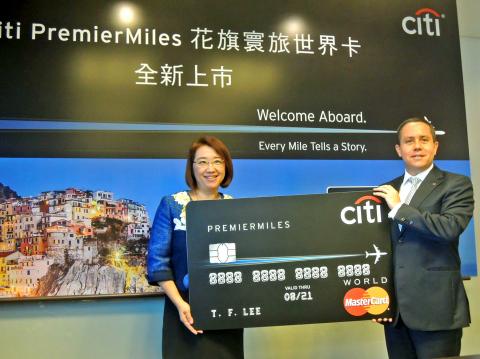Citibank Taiwan Ltd (台灣花旗) yesterday launched a credit card with airline mileage incentives catering to rising travel demand among affluent clients.
The new product was the lender’s latest effort to grow revenue and clients amid fierce competition in the local market.
Since the end of 2014, the number of outbound travelers has grown by a compound annual rate of 11 percent to 11.84 million, Citibank said.

Photo: Lee Ching-hui, Taipei Times
About 33 percent of Taiwanese with annual incomes greater than NT$1.4 million (US$43,163) go abroad at least twice per year, while 17 percent fly overseas once, constituting about half of the higher-income demographic, the bank said, citing external research it commissioned.
The Citi PremierMiles World Card taps into the frequent-fliers market by offering one “Citi Mile” for every NT$20 spent on travel, including airfare, shopping and accommodation, it said.
The new credit card allows travelers to accumulate airline miles faster through loyalty program points in a Citi Mile account, freeing them from being tied to a limited number of carriers.
Clients can yield incentives by spending at more than 60 major airlines and 10,000 hotels worldwide, as well as at major travel agencies, the bank said.
“Unlike arrangements offered by airlines, Citi Miles have no expiration date,” Citibank Taiwan consumer banking business manager Yunny Lee (李芸) said.
“Despite the higher costs of offering airline miles incentives compared with cash-back reward schemes, we strive to satisfy clients’ diverse needs by offering unparalleled flexibility,” Lee said.
In a related development, credit card spending in April reached a five-year high of NT$181 billion, Financial Supervisory Commission data showed.
During the period, Citibank Taiwan recorded about 2.9 million credit cards in use, with a delinquency ratio of 0.5, outperforming other Taiwan-based foreign banks, the data showed.
In the same period, Standard Chartered Bank (Taiwan) Ltd (渣打台灣銀行) recorded more than 373,000 cards and a delinquency ratio of 0.44, while HSBC Bank (Taiwan) Ltd (匯豐台灣商銀) and ANZ Bank (Taiwan) Ltd (澳盛台灣) recorded more than 623,000 and 567,000 cards and delinquency ratios of 0.21 and 0.46 respectively.
DBS Bank Taiwan (星展銀行) recorded about 12,000 cards and a delinquency ratio of 1.53.
For domestic banks, CTBC Bank Co Ltd (中信銀行), the nation’s leading issuer, recorded more than 5.8 million cards in the same period, with a delinquency ratio of 0.14, followed by Cathay United Bank (國泰世華銀行) and E.Sun Commercial Bank (玉山銀行), which recorded 5.3 million and 4.1 million cards and delinquency ratios of 0.14 and 0.24 respectively.

ADVANCED: Previously, Taiwanese chip companies were restricted from building overseas fabs with technology less than two generations behind domestic factories Taiwan Semiconductor Manufacturing Co (TSMC, 台積電), a major chip supplier to Nvidia Corp, would no longer be restricted from investing in next-generation 2-nanometer chip production in the US, the Ministry of Economic Affairs said yesterday. However, the ministry added that the world’s biggest contract chipmaker would not be making any reckless decisions, given the weight of its up to US$30 billion investment. To safeguard Taiwan’s chip technology advantages, the government has barred local chipmakers from making chips using more advanced technologies at their overseas factories, in China particularly. Chipmakers were previously only allowed to produce chips using less advanced technologies, specifically

BRAVE NEW WORLD: Nvidia believes that AI would fuel a new industrial revolution and would ‘do whatever we can’ to guide US AI policy, CEO Jensen Huang said Nvidia Corp cofounder and chief executive officer Jensen Huang (黃仁勳) on Tuesday said he is ready to meet US president-elect Donald Trump and offer his help to the incoming administration. “I’d be delighted to go see him and congratulate him, and do whatever we can to make this administration succeed,” Huang said in an interview with Bloomberg Television, adding that he has not been invited to visit Trump’s home base at Mar-a-Lago in Florida yet. As head of the world’s most valuable chipmaker, Huang has an opportunity to help steer the administration’s artificial intelligence (AI) policy at a moment of rapid change.

TARIFF SURGE: The strong performance could be attributed to the growing artificial intelligence device market and mass orders ahead of potential US tariffs, analysts said The combined revenue of companies listed on the Taiwan Stock Exchange and the Taipei Exchange for the whole of last year totaled NT$44.66 trillion (US$1.35 trillion), up 12.8 percent year-on-year and hit a record high, data compiled by investment consulting firm CMoney showed on Saturday. The result came after listed firms reported a 23.92 percent annual increase in combined revenue for last month at NT$4.1 trillion, the second-highest for the month of December on record, and posted a 15.63 percent rise in combined revenue for the December quarter at NT$12.25 billion, the highest quarterly figure ever, the data showed. Analysts attributed the

Taiwan Semiconductor Manufacturing Co’s (TSMC, 台積電) quarterly sales topped estimates, reinforcing investor hopes that the torrid pace of artificial intelligence (AI) hardware spending would extend into this year. The go-to chipmaker for Nvidia Corp and Apple Inc reported a 39 percent rise in December-quarter revenue to NT$868.5 billion (US$26.35 billion), based on calculations from monthly disclosures. That compared with an average estimate of NT$854.7 billion. The strong showing from Taiwan’s largest company bolsters expectations that big tech companies from Alphabet Inc to Microsoft Corp would continue to build and upgrade datacenters at a rapid clip to propel AI development. Growth accelerated for